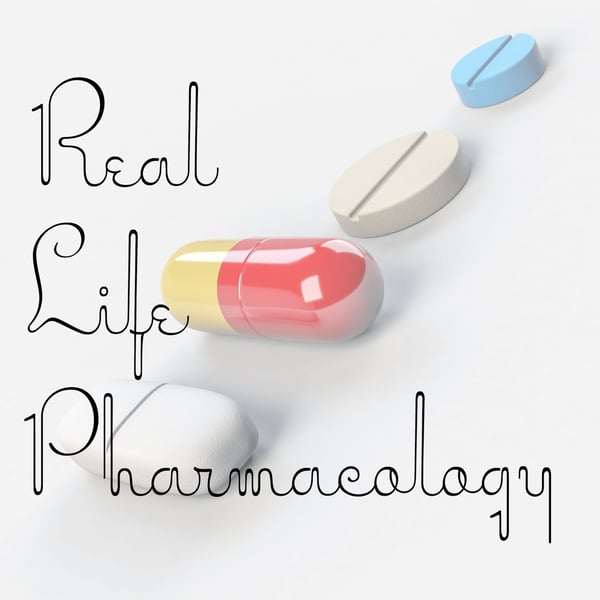Acyclovir Pharmacology
Real Life Pharmacology - Pharmacology Education for Health Care Professionals
Eric Christianson, PharmD; Pharmacology Expert and Clinical Pharmacist
5 • 716 Ratings
🗓️ 12 September 2019
⏱️ 17 minutes
🧾️ Download transcript
Summary
I discuss why acyclovir has to be dosed so many times per day.
Acyclovir can inhibit CYP1A2 which can impact a few drugs. I discuss a couple of those examples on this podcast episode.
GI effects are one of the more common side effects of acyclovir.
Rarely, neuropathy and nephropathy can be part of the adverse effect profile of acyclovir. I discuss this further on this episode.
Transcript
Click on a timestamp to play from that location
| 0:00.0 | Hey all, welcome back to the Real Life Pharmacology podcast. I'm your host, pharmacist, Eric Christensen. |
| 0:06.9 | You can track me down on LinkedIn. You can also find me at reallife pharmacology.com or MedEd101.com |
| 0:16.1 | and hit the contact button there. And you can shoot me an email if you've got any questions, concerns, |
| 0:21.8 | looking for more information there. I try to respond to all the emails I get. I definitely do. |
| 0:28.2 | So you can find me there. With that, let's get into it today. I'm covering a cyclovir. |
| 0:35.1 | Brand name of this medication is Zoverax. And I'm really going to focus primarily on the |
| 0:41.9 | oral dosage form here comes as IV as well. I guess systemic drug in systemic circulation rather |
| 0:50.3 | than the topical acyclavir. So that's going to be my primary focus here. |
| 0:56.2 | So first off, getting into that mechanism of action, |
| 0:59.3 | how does this drug work? |
| 1:01.7 | Well, you've got to remember that it's used for viral infections, |
| 1:06.2 | and it's only used for certain viral infections. |
| 1:09.9 | Okay, so, you know, your common head cold, influenza, those type of viral infections, |
| 1:17.0 | this drug does not get used for that. |
| 1:20.0 | So it's important to remember that. |
| 1:22.8 | The primary uses I'll talk about after the mechanism here. |
| 1:26.4 | But how this drug works, it's actually transformed from its original state by the virus's own |
| 1:34.6 | thymidine kinase, and it gets converted to acyclovir monophosphate, and it continues to have phosphates added, |
| 1:46.1 | phosphate groups added to the drug |
| 1:48.3 | until it becomes acyclivir trifosate. |
| 1:51.9 | And that's really the active component |
| 1:55.8 | that prevents blocks that DNA production |
... |
Please login to see the full transcript.
Disclaimer: The podcast and artwork embedded on this page are from Eric Christianson, PharmD; Pharmacology Expert and Clinical Pharmacist, and are the property of its owner and not affiliated with or endorsed by Tapesearch.
Generated transcripts are the property of Eric Christianson, PharmD; Pharmacology Expert and Clinical Pharmacist and are distributed freely under the Fair Use doctrine. Transcripts generated by Tapesearch are not guaranteed to be accurate.
Copyright © Tapesearch 2025.

